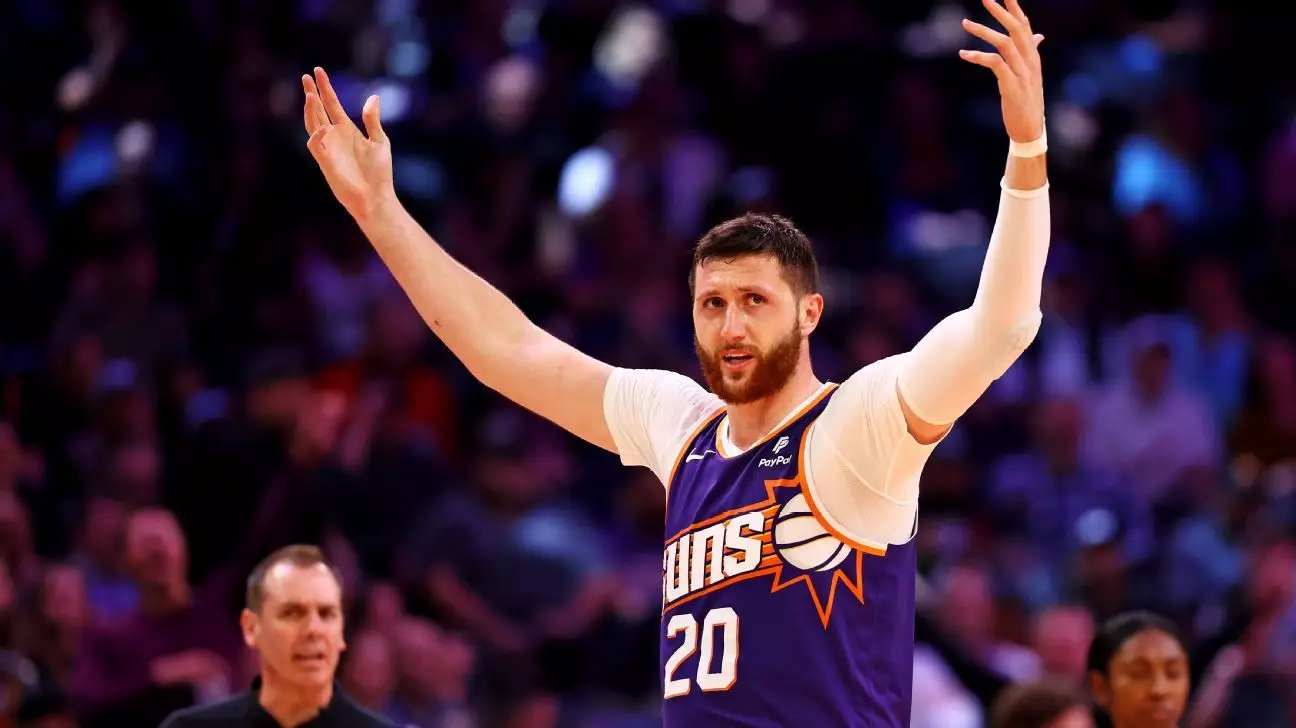In the competitive world of professional sports, relationships between players and coaches significantly impact a team’s dynamics. This truth has come to light through the unsettling comments made by Phoenix Suns center Jusuf Nurkic. Revealing a lack of communication with head coach Mike Budenholzer, Nurkic candidly stated that they have not spoken in two months, suggesting that the two “don’t have a relationship.” Such admissions are not only startling but indicative of underlying issues that may affect team performance and individual morale.
Nurkic’s frustrations are compounded by his lack of playing time; after starting 23 games this season, he has been sidelined since January 7. Nurkic’s absence was exacerbated by the unexpected decision from Budenholzer not to inform him that he would sit out a game against the Atlanta Hawks. Missing nine consecutive games raises questions about Budenholzer’s strategy and approach to team management, highlighting a critical rift between a player who wants to contribute and a coach making decisions with impact on the roster.
It is evident that Nurkic is grappling with feelings of confusion and helplessness regarding his role in the team. “It’s hard to understand why,” he mentioned, articulating the difficulties of adjusting to a bench role after years of starting. For a player who previously enjoyed a starting position, the transition can be jarring and detrimental to self-confidence. The benching signifies more than a mere tactical decision; it evokes questions about his future aspirations and the team’s expectations of him.
Statistics reveal that Nurkic is averaging 8.6 points and 9.2 rebounds, which, while not dazzling, do provide tangible contributions to the team. Yet, as he finds himself swapped out for new faces—like Mason Plumlee and Nick Richards—Nurkic’s situation serves as a stark reminder of the volatility within the NBA. Budenholzer has opted to utilize multiple centers in lieu of Nurkic, leaving him in a precarious position where maintaining readiness becomes a dance of uncertainty.
Despite the apparent chaos brewing in the locker room, Nurkic professes his commitment to professionalism. “For me, just be a pro and do the best I can,” he states, a mantra that expresses the dedication many athletes uphold even amidst adversity. It is commendable that he intends to work hard and remain prepared for any opportunity that arises, showing resilience in the face of discouraging circumstances.
This sentiment of accountability underscores a critical element in sports: maintaining a professional demeanor can sometimes be the most challenging aspect of being benched. Nevertheless, Nurkic underscores the importance of unity within the team, focusing on the larger picture and the collective goals instead of personal misgivings.
The trade deadline on February 6 looms larger than ever, casting shadows over the future of several players, including Nurkic. Having been traded before the season and initially finding success, Nurkic’s current situation has led him to speculate on potential moves. Expressing belief that he will remain with the Suns, he simultaneously acknowledges the transient nature of the league, declaring, “One door closes, another will open eventually.”
Nurkic’s outlook reflects a seasoned understanding of the NBA’s inherent unpredictability. Despite his current plight, he asserts a readiness to pivot should the need arise. His reflections not only resonate with personal experience but also echo the voices of many athletes who have faced similar crossroads throughout their careers.
Nurkic’s comments serve as a clarion call for the Suns organization to address the intricate web of relationships that define team dynamics. The necessity for clear communication, mutual respect, and collaborative growth cannot be overstated. Only through understanding and addressing the challenges faced by players will the Suns become a cohesive unit capable of performing at their best on the court. As the trade deadline approaches and uncertainty looms, both Nurkic and the Suns must navigate their course with vigilance, professionalism, and a shared vision for success.



Leave a Reply